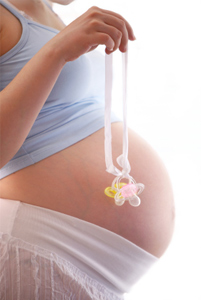Twins | Twin Pregnancy
Twin Pregnancy Symptoms
When you first find out that you are pregnant with twins you might be overwhelmed and slightly stressed out, but soon enough you’ll more likely than not get excited. Twin pregnancies occur more often today than they ever have – general statistics show that in the 21st century as many as three in 100 natural pregnancies and one in four pregnancies with fertility drugs produce twins.
So do women who are pregnant with twins experience or show signs of special symptoms? The answer to that could be both yes and no. Because just as individual women experience a large variety of symptoms with a singleton pregnancy, the same goes for those going through a multiple pregnancy. Symptoms tend to vary from woman to woman and from pregnancy to pregnancy.
Throughout the first few weeks of a twin pregnancy it’s very unlikely that you know you are carrying two little miracles. Most women are only able to confirm the somewhat scary but truly wonderful news via their first ultrasound. However several twin-moms-to-be report that they experience heightened pregnancy symptoms and simply just know that they are expecting twins. Let’s take a look at the most common signs of twin pregnancy.
Extreme fatigue, morning sickness and backache
Twin pregnancy symptoms often happen earlier than those of a singleton pregnancy and can also be a lot more intense. Extreme nausea and vomiting in the first trimester is common, and so is backache. But then again some women don’t experience any of these symptoms at all, so one can never really be sure.
Weight gain
Due to increased uterine size and blood volume early weight gain can be a common symptom of twin pregnancy. And of course, as a twin pregnancy progresses, weight gain increases even more. You are carrying two babies after all! By the end of the second trimester, most mothers of twins have gained 6-12 kilos, whereas singleton pregnancies at that stage usually see gains of 5-10 kilos.
Doppler heartbeat count
The Doppler system amplifies foetal heart sounds using harmless sound waves. Late in the first trimester your practitioner or midwife should be able to detect two rather than one heartbeat through a Doppler test – indicating the fact that you are carrying twins. However this can be misleading and not really trusted to confirm a multiple pregnancy 100%, as sometimes the second heartbeat can be confused with background noise or the mother’s heartbeat.
Abnormal AFP test results
The AFP test measures a protein secreted by the foetal liver, and because more than one baby will increase the amount of this protein in the mother’s blood it will produce a higher AFP test result. This can suggest that your are carrying twins, however a high result can also suggest abnormalities with a single baby, which is why a practitioner in this situation will usually schedule an ultrasound to find out what exactly is going on.
High hCG levels
Women expecting twins have higher levels of the pregnancy hormone hCG in their system. Other hormones, such as progesterone and oestrogen, increase during pregnancy as well – contributing to many of the early physical signs of pregnancy.
Measuring large for gestational age
A twin pregnancy can cause the mother’s uterus to expand more than what is does on average in a single pregnancy. Your practitioner or midwife measure the height of your uterine fundus – from the top of the pubic bone to the top of the uterus – throughout your pregnancy, and can suspect you are expecting twins if your uterus seems larger even in your first trimester. However this expansion can occur as a result of other factors as well, so it still does not confirm 100% that you are carrying two babies.
Early and frequent foetal movement
Although some women might not experience an increase in foetal movement when carrying twin, most do. During the second trimester especially, more foetal movement is expected as your twins will be fighting for space in your womb. Fluttering and frequent kicks is to be expected!
History or intuition
Most of the symptoms we have talked about are visible and potential evidence pointing towards the fact that you are carrying twins. But some women just have a feeling, and one can’t really argue with or explain a mother’s intuition. A family history of twins can also make a difference as fraternal twins can be hereditary. Having identical twins, however, can happen to any woman regardless of there being no twins in her family.
Ultrasound confirmation
Despite all the possible twin pregnancy symptoms we have discussed above, one can never really be sure as most of these symptoms also occur in singleton pregnancies. The best way to confirm it is always by ultrasound. Twins are usually visible via ultrasound as early as week six, so if you have a feeling or just really want to find out whether there’s one or two bundles of joy in your womb, make an appointment with your practitioner.
Once you have confirmed that you are expecting twins, you might worry about what symptoms you’re likely to endure throughout the rest of your pregnancy. As discussed earlier they are similar to those symptoms of a singleton pregnancy, however they can be more intense. Common twin pregnancy symptoms you might experience in your second and third trimester include constipation, ankle swelling, piles, haemorrhoids, varicose veins and indigestion. You might also have increased back ache, difficulty breathing and a very large abdomen. Gestational diabetes, pre-eclampsia and preterm labour are other pregnancy conditions that are more common in multiple than singleton pregnancies.
References:
www.webmd.com
www.baby2see.com



Helpful article. This is a great blog, and I’m sure people will benefit from it. Thanks a lot!